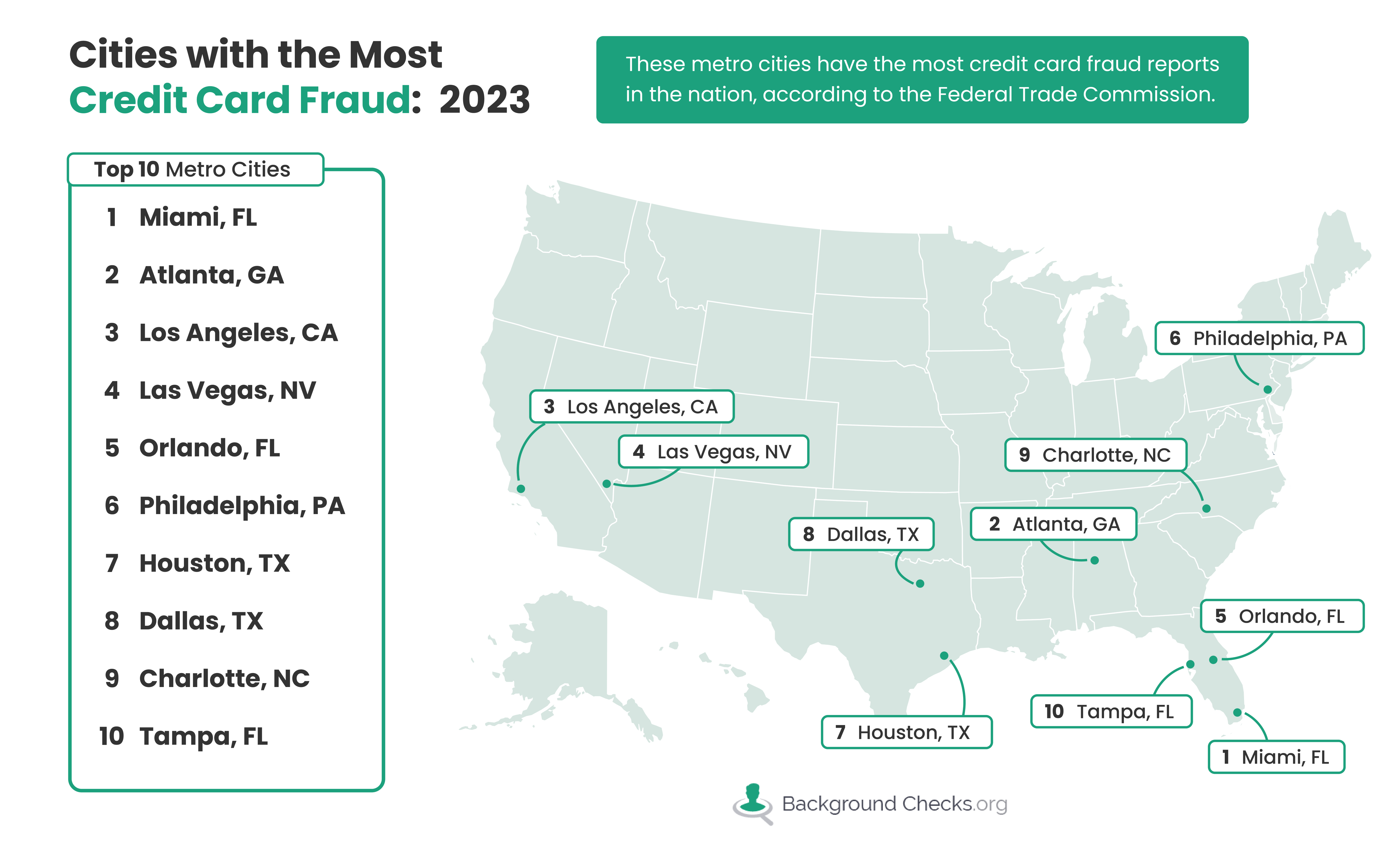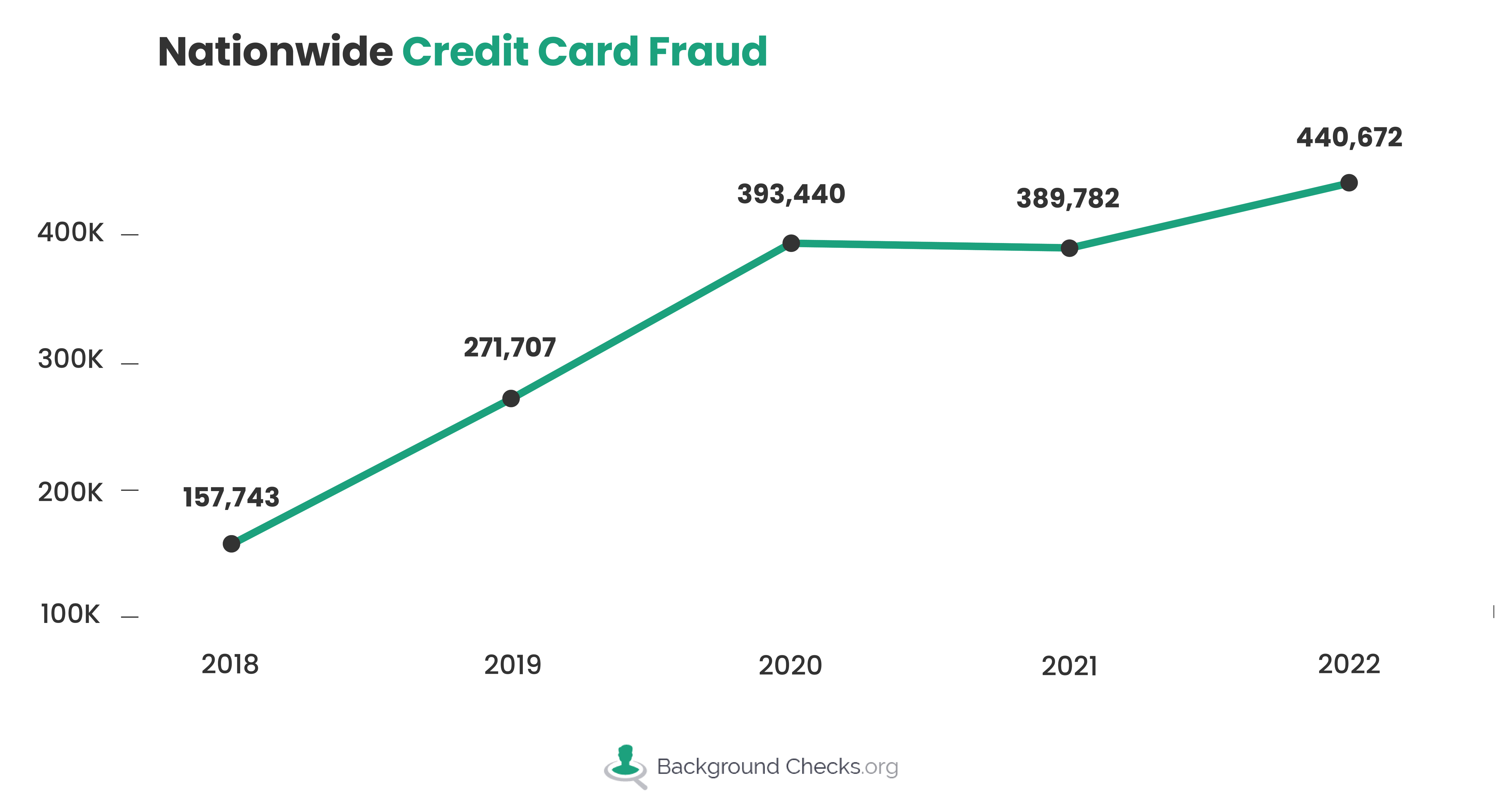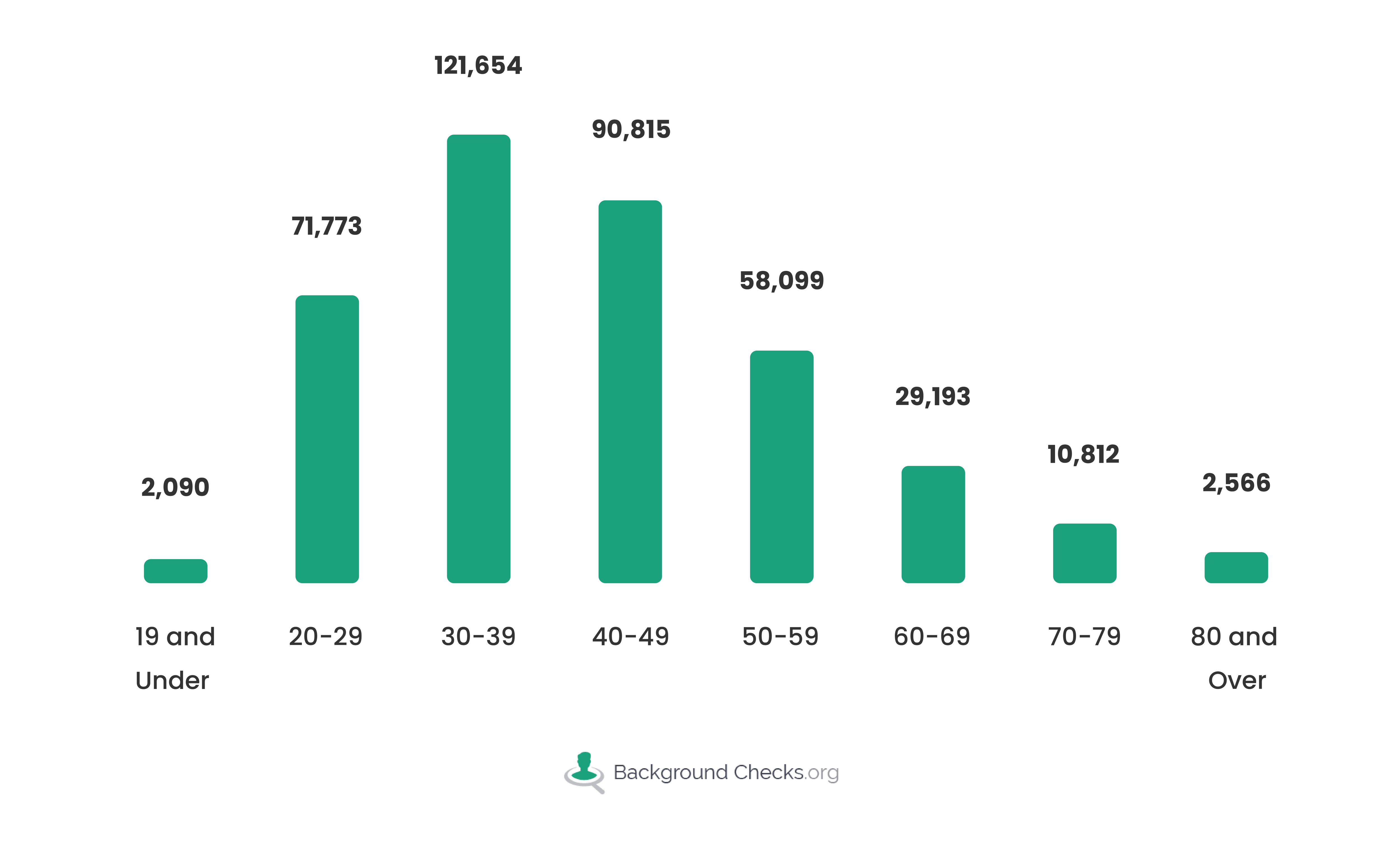Cities with the Most Credit Card Fraud
It’s the holiday shopping season, which means it’s a vulnerable time of year for consumers to fall prey to credit card fraud.
Not only is credit card fraud the most common type of identity theft in 2023, but it’s also more frequent than ever, according to the Federal Trade Commission. In fact, reports of credit card fraud surged by 62% from 2019 (pre-pandemic) to 2022.
Through the first three quarters of 2023, credit card fraud reports are still above pre-pandemic levels, with 318,142 credit card fraud complaints reported so far this year.
But where is credit card fraud the most common?
We analyzed credit card fraud complaint data from the FTC in order to determine which cities and states are the most prone to fraud. Our analysis includes the credit card fraud complaint data from 2023 across the most populated metropolitan areas nationwide.
Table of Contents
Key findings
- Florida is home to the most credit card fraud in the nation, with 170.8 reports per 100,000 residents. Three Florida metro areas—Miami (No. 1), Orlando (No. 5) and Tampa (No. 10)—all rank within the top 10 metros with the most card fraud.
- Atlanta (No. 2), Los Angeles (No. 3), and Las Vegas (No. 4) round out the top five metro cities with the most credit card fraud.
- From 2019 (pre-pandemic) to 2022, credit card fraud skyrocketed by 62%.
- Nationwide, 318,142 credit card fraud complaints have been reported in 2023.
- 30–39-year-olds are the most likely age group to be victims of credit card fraud.
Which cities have the most credit card fraud?

Credit card fraud is defined as the misuse of a consumer's identity to open a fraudulent credit card account or to make unauthorized charges to an existing credit card account.
According to FTC data, Florida is the credit card fraud capital of the U.S. In 2023, consumers in Florida reported a staggering 37,999 instances of credit card fraud. Three Florida metro cities in particular rank among the highest cities in the nation for credit card fraud. The Miami metropolitan area ranks No. 1 for credit card fraud, with more than 20,000 fraud complaints being reported in 2023.
Elsewhere, the Orlando metro area ranks 5th, and the Tampa-St. Petersburg metro area ranks 10th in the nation for card fraud. Both Orlando and Tampa have each reported more than 4,000 fraud complaints this year.
Texas is also home to two cities within the top 10 ranking, including Houston (No. 7) and Dallas (No. 8). Statewide, Texas reported 31,591 instances of credit card fraud, which makes it the 7th highest ranked state in the nation for fraud, according to the FTC.
In terms of other metro cities that are prone to credit card fraud, Atlanta ranks 2nd in the nation with 211.4 credit card fraud reports per 100,000. Los Angeles ranks 3rd with 206.9 per 100,000, followed by Las Vegas (174.5 per 100,000).
Top five cities with the most credit card fraud
#1 Miami–Port St. Lucie–Fort Lauderdale, FL
- 2023 credit card fraud reports: 20,386
- 2023 credit card fraud reports per 100K: 332.1
#2 Atlanta–Athens-Clarke County–Sandy Springs, GA-AL
- 2023 credit card fraud reports: 13,186
- 2023 credit card fraud reports per 100K: 211.4
#3 Los Angeles–Long Beach, CA
- 2023 credit card fraud reports: 26,638
- 2023 credit card fraud reports per 100K: 206.9
#4 Las Vegas–Henderson, NV
- 2023 credit card fraud reports: 4,053
- 2023 credit card fraud reports per 100K: 174.5
#5 Orlando–Lakeland–Deltona, FL
- 2023 credit card fraud reports: 4,728
- 2023 credit card fraud reports per 100K: 171.0
Where credit card fraud is on the rise
Not only has credit card fraud skyrocketed since the pandemic, but in several cities, fraud has also seen a year-over-year increase. Topping the list of cities that have experienced the largest year-over-year increase in card fraud is Hartford, Connecticut. According to the FTC, fraud is up by one-quarter (25.5%) in Hartford compared to 2022.
Elsewhere, Detroit has seen a 19% year-over-year increase. Fraud is also up by 18.6% in Columbus, Ohio and about 16% in both San Francisco, California as well as Boston, Massachusetts.

Credit card fraud by age

Credit card fraud can happen to any consumer, regardless of their age, but older millennials between the ages of 30-39 are the most likely to fall victim to credit card fraud.
According to the FTC, millennials between 30-39 years old make up nearly one-third of credit card fraud victims. In 2022, 121,654 millennials aged 30-39 were victims of credit card fraud.
States with the most credit card fraud
Along with analyzing credit card fraud in metro cities, we also looked at fraud on the statewide level. Florida tops the list with 170.8 complaints per 100,000. Total losses for all types of fraud including credit card fraud and other forms of identity theft in the Sunshine State total $451.8 million in 2023.
Head north of Florida to find the state with the 2nd most credit card fraud complaints. Georgia reported 153.2 complaints per 100,000, which is more than 16,000.
Despite being one of the least populated states in the country, Delaware ranks 4th in the nation for credit card fraud reports per 100,000. In 2023, Delaware reported 125.4 credit card fraud instances per 100,000.
Although credit card fraud is the most common type of fraud, there are several steps you can take to avoid falling victim. The FTC recommends that consumers check their credit reports frequently as well as review bank and credit card statements to keep an eye out for unauthorized transactions or suspicious activity.
It’s also recommended to avoid using public wi-fi when conducting financial transactions. Consumers should also set up a strong password. The FTC also warns against providing credit card details over the phone unless you have initiated the phone call.
Running a background check on yourself can also reveal signs of identity theft. If you have been a victim of credit card fraud, notify your bank and place a fraud alert on your credit reports.
You can also report credit card fraud to the FTC, which can help future fraud from occurring and bring cases against scams as well as bad business practices.
Methodology
To establish our ranking, we conducted an analysis of credit card fraud complaints in the 50 most populated metropolitan statistical areas in the country, as well as all 50 states, utilizing data from the Federal Trade Commission’s Consumer Sentinel Network. The ranking of metropolitan areas and states was determined based on the incidence of credit card fraud reports per 100,000 residents. This analysis encompassed historical data spanning from 2018 to 2022, as well as the most recent available data from the first three quarters of 2023. The definition of metropolitan areas adheres to the criteria set forth by the Office of Management and Budget.
Sources: Federal Trade Commission Consumer Sentinel Network, U.S. Census Bureau.
Fair Use: Feel free to use this data and research with proper attribution linking to this study.
Media Inquiries: For media inquiries, contact media@thisisnoble.co

